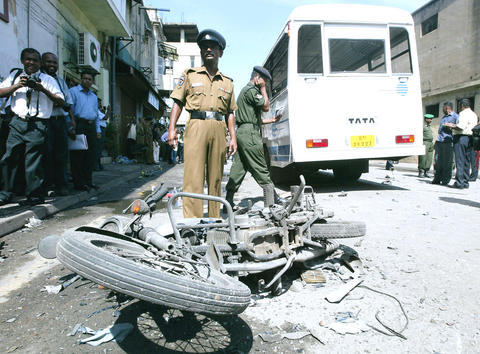A flotilla of rebel boats raided a navy camp in northern Sri Lanka early yesterday, killing as many as 35 sailors, hours before a bomb exploded near an army bus in the capital and wounded seven people.
The surge in violence came amid a deepening conflict between the government and separatist Tamil Tiger rebels that has shattered an internationally backed peace process and left at least 5,000 people dead in the past 18 months.
The Tamil rebels attacked the navy base in the village of Delft just after midnight, arriving in 15 boats, navy spokesman Commander DKP Dassanayake said. Navy sailors sank one boat, he added.

PHOTO: AP
The attack left 35 sailors dead, rebel spokesman Rasiah Ilanthirayan said. He said four insurgents were killed in the assault. His claims, however, could not be confirmed, and the military had no details on casualties from the attack.
"The fighting lasted only 20 minutes and we completely overran the camp," Ilanthirayan said. The rebel forces then fled the scene by boat, he said.
"Our attacking unit counted 35 bodies during the time they were in [the camp] but had to come back quickly," he said.
Ilanthirayan said the rebels attacked in about 12 boats, and none were sunk.
Later yesterday morning in Colombo, the capital, a bomb exploded near a bus carrying soldiers.
The bomb, attached to a motorcycle parked in a crowded shopping area, exploded as the bus went past, said Defense Ministry spokesman Lieutenant Colonel Upali Rajapakse. Four soldiers and three civilians were wounded, he said.
Passers-by rushed to help the victims.
"Soon after the explosion, the bus burst into flames, and then I brought the injured to the hospital," said Colombo resident Chandana Mahanama, who was traveling in his car just behind the bus when the bomb went off.
Rajapakse blamed the rebels for the bus bombing, but Ilanthirayan denied they were involved.
The violence occurred a day after the International Committee of the Red Cross announced it had withdrawn its staff from two checkpoints between government-held and rebel areas in northern Sri Lanka because of the escalating violence.
The withdrawal of the Red Cross effectively shuts down the checkpoints, stopping aid workers and cease-fire monitors from traveling between rebel-held and government areas.
On Wednesday, at least 15 people were killed in a roadside bomb and in clashes in northern and eastern Sri Lanka, the military said.
The rebels have fought the government since 1983 to create a separate homeland for the island nation's minority ethnic Tamils, who have suffered decades of discrimination under the Sinhalese-dominated government.
Nearly 70,000 people have died in the conflict, including about 5,000 killed since December 2005, when violence flared despite a 2002 cease-fire that is now in tatters.

FRUSTRATIONS: One in seven youths in China and Indonesia are unemployed, and many in the region are stuck in low-productivity jobs, the World Bank said Young people across Asia are struggling to find good jobs, with many stuck in low-productivity work that the World Bank said could strain social stability as frustrations fuel a global wave of youth-led protests. The bank highlighted a persistent gap between younger and more experienced workers across several Asian economies in a regional economic update released yesterday, noting that one in seven young people in China and Indonesia are unemployed. The share of people now vulnerable to falling into poverty is now larger than the middle class in most countries, it said. “The employment rate is generally high, but the young struggle to

STEPPING UP: Diminished US polar science presence mean opportunities for the UK and other countries, although China or Russia might also fill that gap, a researcher said The UK’s flagship polar research vessel is to head to Antarctica next week to help advance dozens of climate change-linked science projects, as Western nations spearhead studies there while the US withdraws. The RRS Sir David Attenborough, a state-of-the-art ship named after the renowned British naturalist, would aid research on everything from “hunting underwater tsunamis” to tracking glacier melt and whale populations. Operated by the British Antarctic Survey (BAS), the country’s polar research institute, the 15,000-tonne icebreaker — boasting a helipad, and various laboratories and gadgetry — is pivotal to the UK’s efforts to assess climate change’s impact there. “The saying goes

ENERGY SHIFT: A report by Ember suggests it is possible for the world to wean off polluting sources of power, such as coal and gas, even as demand for electricity surges Worldwide solar and wind power generation has outpaced electricity demand this year, and for the first time on record, renewable energies combined generated more power than coal, a new analysis said. Global solar generation grew by a record 31 percent in the first half of the year, while wind generation grew 7.7 percent, according to the report by the energy think tank Ember, which was released after midnight yesterday. Solar and wind generation combined grew by more than 400 terawatt hours, which was more than the increase in overall global demand during the same period, it said. The findings suggest it is

TICKING CLOCK: A path to a budget agreement was still possible, the president’s office said, as a debate on reversing an increase of the pension age carries on French President Emmanuel Macron yesterday was racing to find a new prime minister within a two-day deadline after the resignation of outgoing French Prime Minister Sebastien Lecornu tipped the country deeper into political crisis. The presidency late on Wednesday said that Macron would name a new prime minister within 48 hours, indicating that the appointment would come by this evening at the latest. Lecornu told French television in an interview that he expected a new prime minister to be named — rather than early legislative elections or Macron’s resignation — to resolve the crisis. The developments were the latest twists in three tumultuous